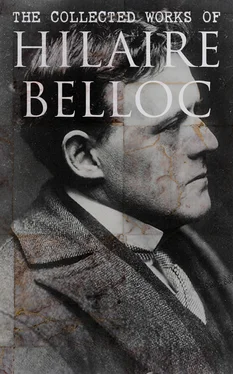He used not only the national but also the revolutionary temper in war. One of the chief features, for instance, of the revolutionary armies when they began to be successful, was the development of lines of skirmishers who pushed out hardily before the main bodies and were the first in the history of modern warfare to learn the use of cover. This development was spontaneous: it was produced within and by each unit, not by any general command. But Carnot recognised it at Hoondschoote and used it ever after.
The stoical inflexibility of his temper is the noblest among the many noble characters of his soul. He never admitted the empire, and he suffered exile, seeming thereby in the eyes of the vilest and most intelligent of his contemporaries, Fouché, to be a mere fool. He was as hard with himself as with others, wholly military in the framework of his mind, and the chief controller of the Terror, which he used, as it was intended to be used, for the military salvation of the republic.
Marat is easily judged. The complete sincerity of the enthusiast is not difficult to appreciate when his enthusiasm is devoted to a simple human ideal which has been, as it were, fundamental and common to the human race.
Equality within the State and the government of the State by its general will: these primal dogmas, on the reversion to which the whole Revolution turned, were Marat's creed.
Those who would ridicule or condemn him because he held such a creed, are manifestly incapable of discussing the matter at all. The ridicule and condemnation under which Marat justly falls do not attach to the patent moral truths he held, but to the manner in which he held them. He did not only hold them isolated from other truths—it is the fault of the fanatic so to hold any truth—but he held them as though no other truths existed. And whenever he found his ideal to be in practice working at a friction or stopped dead, his unnourished and acute enthusiasms at once sought a scapegoat, discovered a responsible agent, and suggested a violent outlet, for the delay.
He was often right when he denounced a political intriguer: he often would have sacrificed a victim not unjustly condemned, he often discovered an agent partially responsible, and even the violent solutions that he suggested were not always impracticable. But it was the prime error of his tortured mind that beyond victims, and sudden violent clutches at the success of democracy, there was nothing else he could conceive. He was incapable of allowing for imperfections, for stupidities, for the misapprehension of mind by mind, for the mere action of time, and for all that renders human life infinitely complex and infinitely adjustable.
Humour, the reflection of such wisdom, he lacked;—"judgment" (as the English idiom has it) he lacked still more—if a comparative term may be attached to two such absolute vacuities.
It must not be forgotten that so complete an absence of certain necessary qualities in the building up of a mind are equivalent to madness. Marat was not sane. His insanity was often generous, the creed to which it was attached was obvious enough, and in the eyes of most of us it is a creed to be accepted. But he worked with it as a madman who is mad on collectivism, let us say, or the rights of property, might work in our society, thinking of his one thesis, shrieking it and foaming at the mouth upon it, losing all control when its acceptance was not even opposed but merely delayed. He was valueless for the accomplishment of the ends of the Revolution. His doctrine and his adherence to it were so conspicuously simple and sincere that it is no wonder the populace made him (for a few months) a sort of symbol of their demand.
For the rest, his face, like his character, was tortured; he carried with him a disease of the skin that irritated perpetually his wholly unbalanced temper.
Some say (but one must always beware of so-called "Science" in the reading of history) that a mixture of racial types produced in him a perpetual physical disturbance: his face was certainly distorted and ill-balanced—but physical suggestions of that sort are very untrustworthy.
Those who met him in the management of affairs thought him worthless enough; a few who knew him intimately loved him dearly; more who came across him continually were fatigued and irritated by his empty violence. He was, among those young revolutionaries, almost an elderly man; he was (this should never be forgotten) a distinguished scholar in his own trade, that of medicine; and he effected less in the Revolution than any man to whom a reputation of equal prominence happened to attach. He must stand responsible for the massacres of September. 2
No character in the Revolution needs for its comprehension a wider reading and a greater knowledge of the national character than Robespierre's.
Upon no character does the comprehension of the period more depend, and none (for reasons I will give in a moment) has been more misunderstood, not only in the popular legend but in the weighed decisions of competent historians.
So true is this that even time, which (in company with scholarship) usually redresses such errors, has not yet permitted modern authors to give a true picture of the man.
The reason of so conspicuous a failure in the domain of history is this: that side by side with the real Robespierre there existed in the minds of all his contemporaries save those who actually came across him in the junctions of government , a legendary Robespierre—a Robespierre popularly imagined; and that this imaginary Robespierre, while it (or he) has proved odious to posterity, seemed, while he lived, a fascinating portrait to the man himself, and therefore he accepted it. For Robespierre, though just, lacked humility.
The problem is an exceedingly subtle as well as an exceedingly difficult one. The historian, as he reads his authorities, has perpetually to distinguish between what is strong and what is weak evidence, and to recall himself, as he reads, to reality by a recollection of what Robespierre himself was. If he does not do so he falls at once into the legend; so powerful is that legend in the numbers that supported it, and so strongly did Robespierre himself support it by his own attitude. The legendary Robespierre may be described in a very few lines.
Conceive a man sincerely convinced of the purest democratic theory, a man who cared for nothing else but the realisation of that theory, and who had never sacrificed his pursuit of its realisation in the State to any personal advantage whatsoever. This man, trusted by the people and at last idolised by them, becomes more and more powerful. He enters the governing body (the Committee of Public Safety), he is the master both within and without that body, and uses his mastery for establishing an ideal democracy which shall recognise the existence of God and repose upon civic virtue; and to establish this ideal he has recourse to terror. He finds that human defections from his ideal are increasingly numerous: he punishes them by death. The slaughter grows to be enormous; the best of Democrats are involved in it; at last it can be tolerated no longer, his immediate subordinates revolt against him in the Committee, he is outlawed, fails to raise a popular rebellion in his favour in Paris, is executed, and his system of terror falls to the ground.
This picture, though purely legendary in tone, contains not only much truth, but truth of precisely that sort which conspires to make credible what is false in the whole.
Robespierre was sincerely attached to the conception of an ideal democracy; he was incorruptible in the pursuit of it—and to be a politician and incorruptible amounts to something like what the Church calls heroic virtue in a man. He did enter the Committee of Public Safety; he did support the Terror, and when he was overthrown the Terror did come to an end. Where, then, does the legend differ from the truth?
Читать дальше












